To begin building a customized skincare regimen, first determine your skin type – whether it is oily, dry, combination, or sensitive. Next, establish key steps: cleanse morning and night, tone to maintain pH balance, moisturize according to your skin’s needs, and always use broad-spectrum sunscreen. Adjust your products as the seasons change and address specific concerns such as acne or aging. Observe how your skin reacts to various treatments and seek professional guidance for more complex issues. This personalized method can significantly improve the health and appearance of your skin. Continue exploring to uncover additional tips and knowledge on successful skincare.
Key Takeaways
- Identify your skin type—oily, dry, combination, or sensitive—to curate an effective skincare routine tailored to your needs.
- Customize product selection by incorporating targeted ingredients that address specific concerns like acne, aging, or hyperpigmentation.
- Adjust your skincare routine seasonally, using heavier moisturizers in winter and lighter products in summer for optimal hydration.
- Consistently apply broad-spectrum sunscreen with at least SPF 30 daily, reapplying every two hours for effective UV protection.
Understanding Skin Types
To create an effective skincare routine, you need to first identify your skin type—whether it's oily, dry, combination, sensitive, or normal. Understanding your skin type is vital for selecting the right skincare products and targeted treatments that address your specific needs.
If you have oily skin, you'll notice excess sebum production, leading to acne and enlarged pores. In this case, opt for non-comedogenic products and ingredients like salicylic acid to help manage oil levels.
On the other hand, dry skin lacks moisture and can feel tight or flaky. For dry skin, choose products with hydrating ingredients such as hyaluronic acid and glycerin, and avoid harsh cleansers that can exacerbate the issue.
For those with combination skin, you might experience both oily and dry areas, typically with an oily T-zone and dry cheeks. Look for balanced products and lightweight moisturizers to cater to both concerns.
Meanwhile, sensitive skin is easily irritated and prone to redness, so it's important to use fragrance-free, hypoallergenic products. Always patch test new items before full application to avoid adverse reactions.
Understanding your skin type sets the foundation for a personalized skincare routine.
Essential Steps in Skincare
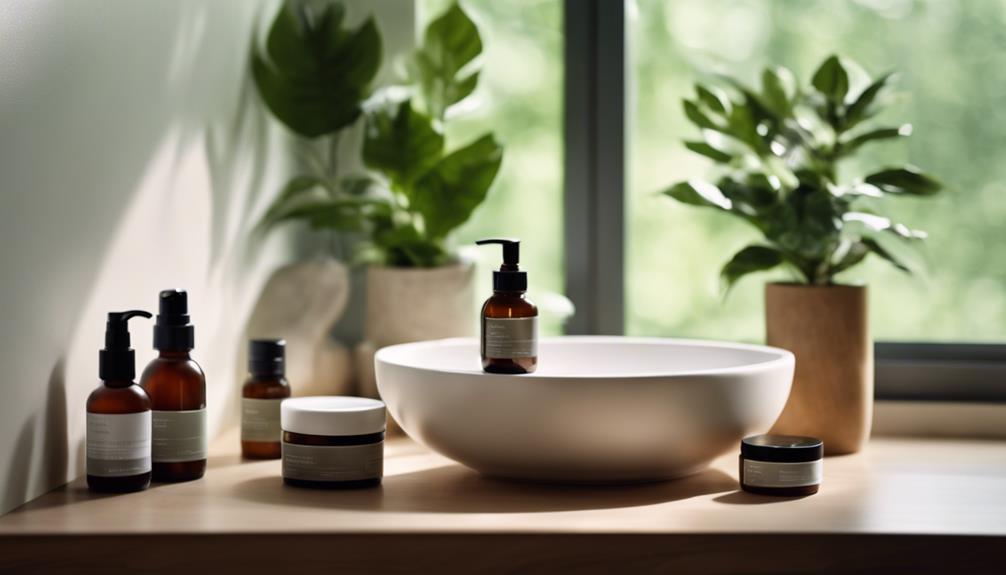
Cleansing, toning, moisturizing, and applying sunscreen form the essential steps in any effective skincare routine.
Start your day by cleansing your skin twice daily—once in the morning and once at night. This helps remove impurities and excess oils, paving the way for healthy skin.
After cleansing, incorporate toning. This step balances your skin's pH levels, preparing it for better absorption of the products that follow.
Next, focus on moisturizing. Choose a moisturizer tailored to your specific skin type to maintain hydration and protect your skin barrier. Proper moisturizing is vital to prevent dryness and irritation, ensuring your skin stays supple.
Importance of Sun Protection

Protecting your skin from the sun is essential for maintaining its health and appearance.
You should apply broad-spectrum sunscreen with at least SPF 30 every day, even when it's cloudy, to shield against harmful UV rays.
Don't forget to reapply every two hours, especially if you're sweating or swimming, to guarantee your skin stays safe and youthful.
Daily Sunscreen Application
Applying broad-spectrum sunscreen daily is vital for safeguarding your skin from harmful UVA and UVB rays, which can lead to premature aging and damage. Using a broad-spectrum sunscreen with at least SPF 30 is essential, as it effectively protects against these rays. Make certain to apply it generously to all exposed skin, including often-overlooked areas like your ears, neck, and scalp.
Incorporating daily sunscreen application as the final step in your morning skincare routine guarantees your skin is shielded from environmental aggressors throughout the day. Remember, even on cloudy days, up to 80% of UV rays can penetrate through the clouds, so don't skip this important step.
To maintain maximum protection, you'll need to reapply every two hours, or immediately after swimming or sweating. This regular reapplication helps maintain the sunscreen's effectiveness, keeping your skin safe from harmful rays.
Broad-Spectrum Protection Essentials
Understanding the importance of broad-spectrum protection is essential for maintaining healthy skin and preventing long-term damage from harmful UV rays.
Using a broad-spectrum sunscreen with an SPF of 30 or higher is critical for shielding your skin from both UVA and UVB rays. UVA rays contribute to skin aging, while UVB rays cause sunburn.
Here's why it matters:
- Prevents premature aging: Regular use helps minimize fine lines and hyperpigmentation.
- Reduces skin cancer risk: Broad-spectrum protection considerably lowers your chances of developing skin cancer.
- Daily necessity: Apply sunscreen every day, regardless of weather conditions.
Make broad-spectrum sunscreen the final step in your morning skincare routine. This simple habit not only guarantees you're protected against harmful UV radiation, but it also contributes to long-term skin health.
Remember to apply it generously—about one ounce for full-body coverage—and reapply as needed.
Reapplication During Activities
Reapplying sunscreen every two hours during outdoor activities is key to maintaining effective protection from harmful UV rays. Even on cloudy days, you can still receive up to 80% of UV rays, so daily sunscreen use is vital to prevent premature aging and skin damage. Choose a broad-spectrum sunscreen with at least SPF 30 to defend against UVA and UVB rays effectively.
If you plan on swimming or engaging in activities that make you sweat, opt for a water-resistant sunscreen. This guarantees that your skin protection remains intact even when you're active. Remember, reapplication is essential — even the best sunscreen loses effectiveness over time, especially with water exposure or heavy perspiration.
In addition to sunscreen, consider incorporating physical barriers like hats and UV-protective clothing into your routine. These can provide extra layers of skin protection, complementing your sunscreen efforts.
Tailoring Your Routine
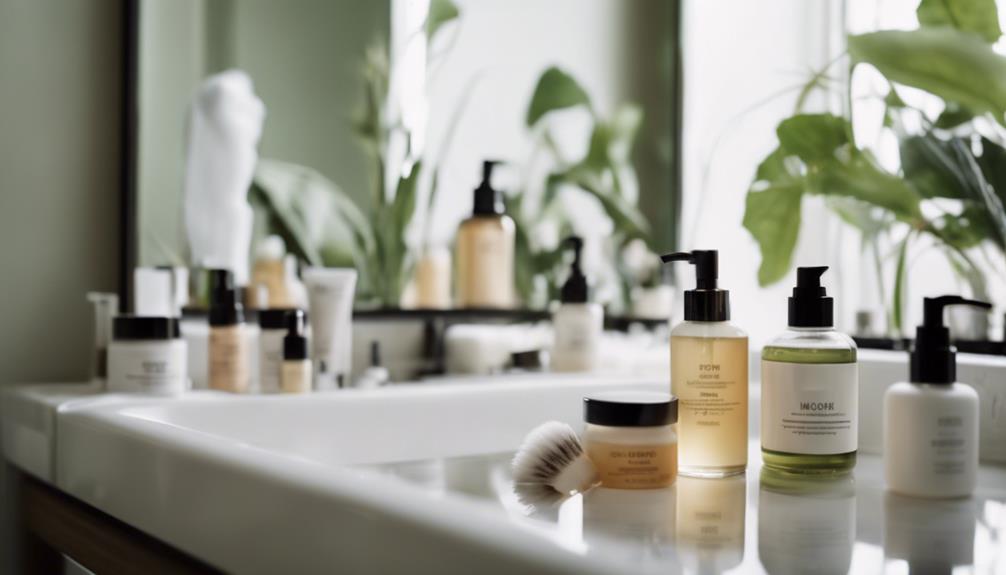
To tailor your skincare routine effectively, start by identifying your skin type—whether it's oily, dry, combination, sensitive, or normal.
Next, customize your product selection to address specific concerns and don't forget to adjust your routine for seasonal changes.
This way, you'll keep your skin healthy and glowing all year round.
Identify Skin Type
Identifying your skin type is essential for tailoring an effective skincare routine that meets your unique needs. To do this, you should assess how your skin feels after cleansing. This simple evaluation will help you identify skin type and concerns accurately.
Consider these characteristics to determine your skin type:
- If your skin feels tight and dry, you likely have dry skin.
- If your skin appears shiny and feels greasy, you have oily skin.
- A combination of dry patches and oiliness indicates combination skin.
It's also important to evaluate other features, like enlarged pores or breakouts, which can signal oily skin.
Remember, regular reassessment is key—factors like climate, diet, and hormonal changes can influence your skin's characteristics over time.
If you're trying new products, conduct a patch test, especially if you have sensitive skin.
Understanding your skin type is the first step towards a customized skincare routine that addresses your specific needs effectively.
Customize Product Selection
Customizing your product selection is crucial for creating a skincare routine that effectively addresses your unique skin concerns and type.
Start by identifying your skin type—whether it's oily, dry, combination, sensitive, or normal—so you can select products tailored to your individual needs. Incorporate targeted ingredients based on specific issues; for instance, use salicylic acid or benzoyl peroxide if you're dealing with acne-prone skin, and opt for hyaluronic acid to enhance hydration for dry skin.
If your skin is oily or acne-prone, choose non-comedogenic products to prevent clogged pores and breakouts. It's also important to regularly assess your skin's response to the products you use. As your skin can change due to factors like weather, diet, and hormonal fluctuations, be prepared to adjust your routine accordingly.
Don't hesitate to consult with skincare professionals for personalized product recommendations. They can guide you in ensuring compatibility among your chosen products, leading to ideal results.
Adjust for Seasonal Changes
As the seasons change, your skincare routine should adapt to meet the shifting demands of your skin. You need to adjust for seasonal changes to maintain healthy skin throughout the year. Pay attention to your moisturizer's consistency; switch to a heavier cream in winter for dryness and a lighter gel in summer to combat excess oiliness.
Consider these key points:
- Incorporate hydrating ingredients like hyaluronic acid during colder months to combat moisture loss.
- Use oil-controlling ingredients, such as salicylic acid, in hotter months to manage breakouts.
- Adjust your exfoliation frequency: increase it in winter to remove dead skin cells and opt for gentle exfoliation in summer to avoid irritation from sun exposure.
Regularly assess your skin's response to products with each season, as humidity, temperature, and sun exposure can greatly impact your skin's needs. By tailoring your routine accordingly, you can keep your skin looking its best all year round.
Targeted Treatments for Concerns
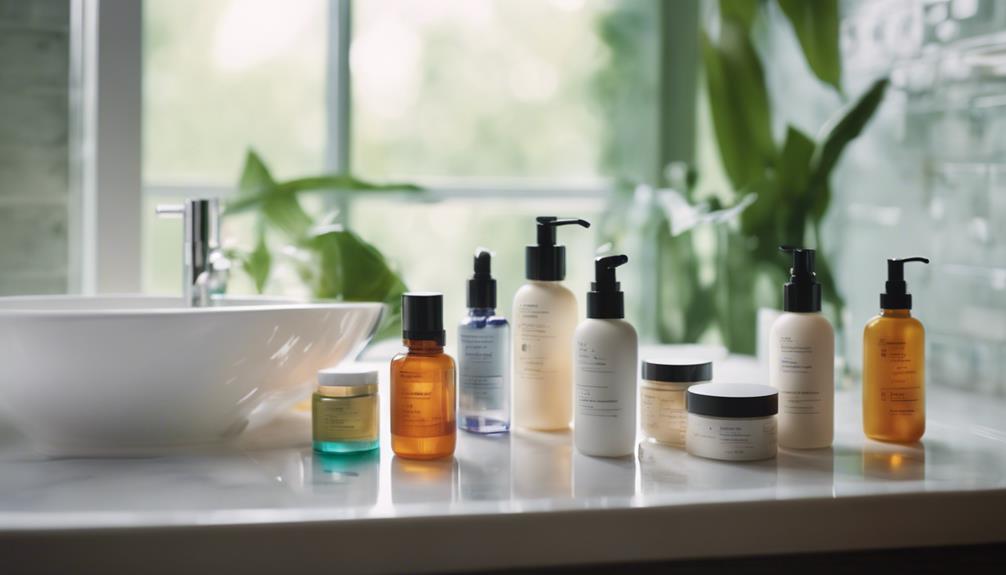
Targeted treatments effectively address specific skin concerns, ensuring you get the best results from your skincare routine.
If you struggle with acne, look for products that contain salicylic acid or benzoyl peroxide. These ingredients help unclog pores and reduce inflammation, giving you clearer skin.
For aging concerns, incorporating antioxidants like vitamin C and retinoids can greatly improve your skin's texture and minimize fine lines.
If hyperpigmentation is an issue, consider treatments with niacinamide or alpha hydroxy acids (AHAs). These ingredients promote cell turnover and help even out your skin tone.
For those with sensitive skin, soothing ingredients like chamomile and aloe vera are your best friends. They reduce redness and irritation while providing much-needed hydration.
Monitoring Skin Responses
To create the best skincare routine for yourself, you need to track how your skin reacts to different products over time.
If you notice any irritation or changes, it's essential to adjust your routine to keep your skin healthy.
Track Product Reactions
Monitoring how your skin reacts to new products is essential for creating an effective personalized skincare routine. By keeping track of product reactions, you can identify what works best for your skin and avoid ingredients that cause issues.
Start a skincare journal to document your product application, frequency, and any side effects. This will help you understand potential reactions and make informed adjustments.
Here are some key points to reflect on:
- Regularly observe changes in your skin's texture, tone, and overall appearance after trying new products.
- Pay attention to common signs of irritation, like redness, itching, or breakouts.
- Reassess your skincare routine every few weeks, especially after introducing new items.
Adjusting Routine Accordingly
Adjusting your skincare routine based on how your skin responds to products can greatly enhance its effectiveness and overall health. Start by regularly evaluating your skin's reaction. Monitor for signs of irritation like redness or itching; if you notice these, it might be time to simplify your routine or switch to gentler formulations.
Keeping a skincare journal is a great way to track product effectiveness and any reactions, helping you identify patterns over time.
Don't forget to reflect on seasonal changes, as they can meaningfully impact your skin's needs. For instance, you might need heavier moisturizers in winter and lighter formulations in summer.
If your skin type changes or you experience persistent issues, it's wise to consult with skincare specialists for professional evaluations. They can help tailor your routine to better suit your skin's current condition.
Ultimately, adjusting your routine accordingly guarantees that your skincare efforts remain effective. By staying attuned to your skin's needs, you can achieve a healthier, more radiant complexion.
Product Selection Guidelines
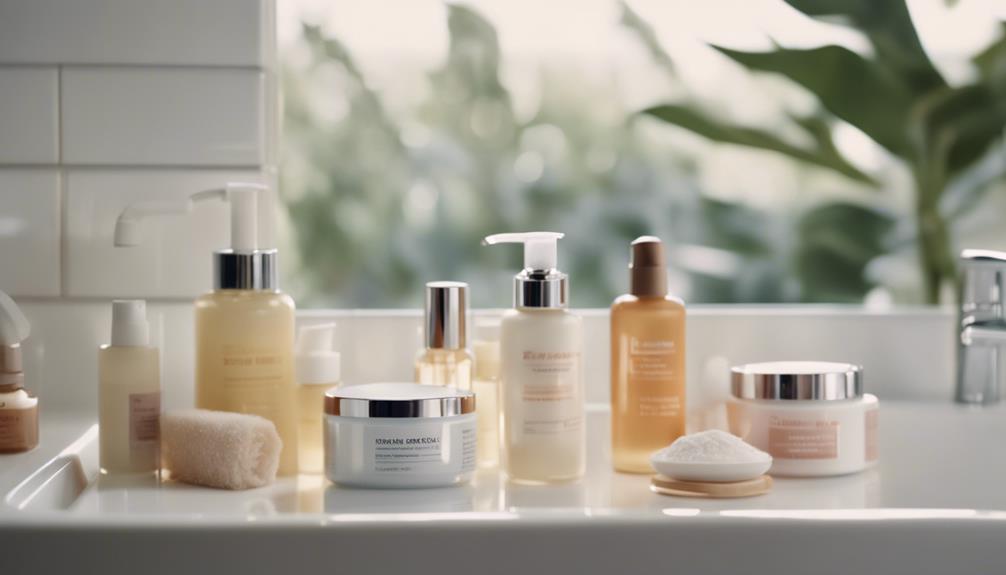
Understanding your skin type is essential for choosing products that effectively target your unique concerns.
Whether your skin is oily, dry, combination, sensitive, or normal, selecting the right skincare products can make all the difference in achieving a personalized skincare routine.
As you navigate product selection guidelines, keep these key points in mind:
- Identify key ingredients that align with your specific skin concerns, like salicylic acid for acne or hyaluronic acid for hydration.
- Opt for non-comedogenic products if you have oily or acne-prone skin to avoid clogged pores.
- Carefully read product labels, especially if your skin is sensitive; look for fragrance-free and hypoallergenic options.
Lifestyle's Impact on Skin
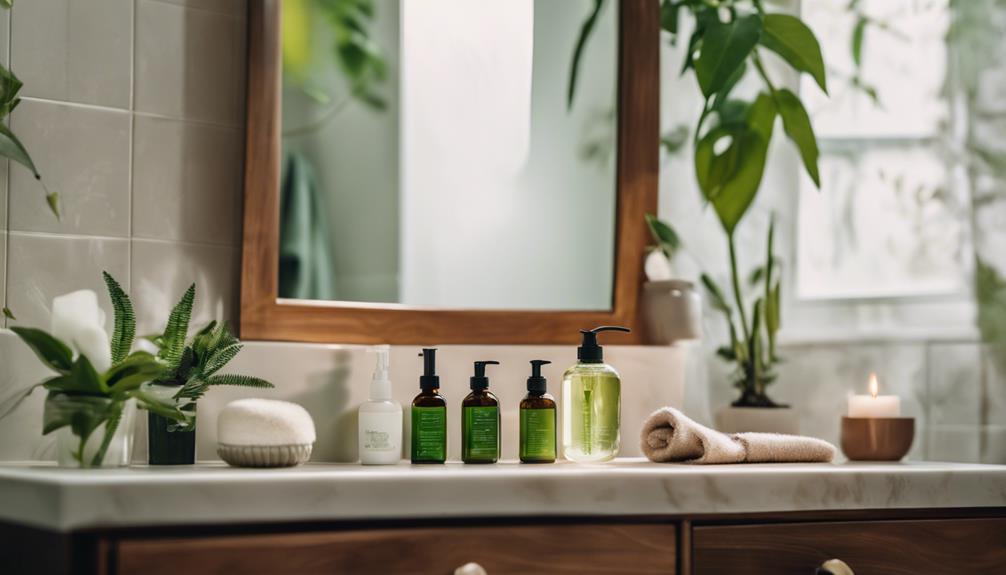
Your daily lifestyle choices play an essential role in the health and appearance of your skin. The way you eat, move, and manage stress can greatly influence skin health. A balanced diet rich in fruits, vegetables, and lean proteins provides critical nutrients and antioxidants that combat oxidative stress, enhancing your skin's vitality.
Hydration is equally important; staying well-hydrated improves your skin's elasticity and reduces dryness, giving you a healthier complexion. Don't underestimate the power of quality sleep, either. A consistent sleep schedule promotes skin repair and rejuvenation, helping you wake up with a fresh, glowing face.
Regular physical activity boosts blood circulation, delivering essential nutrients and oxygen to your skin cells. This can further enhance your skin's appearance. Plus, stress management techniques like mindfulness and yoga can help reduce inflammation and hormonal fluctuations, which are major contributors to skin issues like acne and eczema.
Incorporating these lifestyle changes into your routine can lead to a noticeable improvement in your skin's health and overall appearance. So, prioritize your nutrition, hydration, sleep, exercise, and stress management for that radiant glow!
Seasonal Adjustments in Care
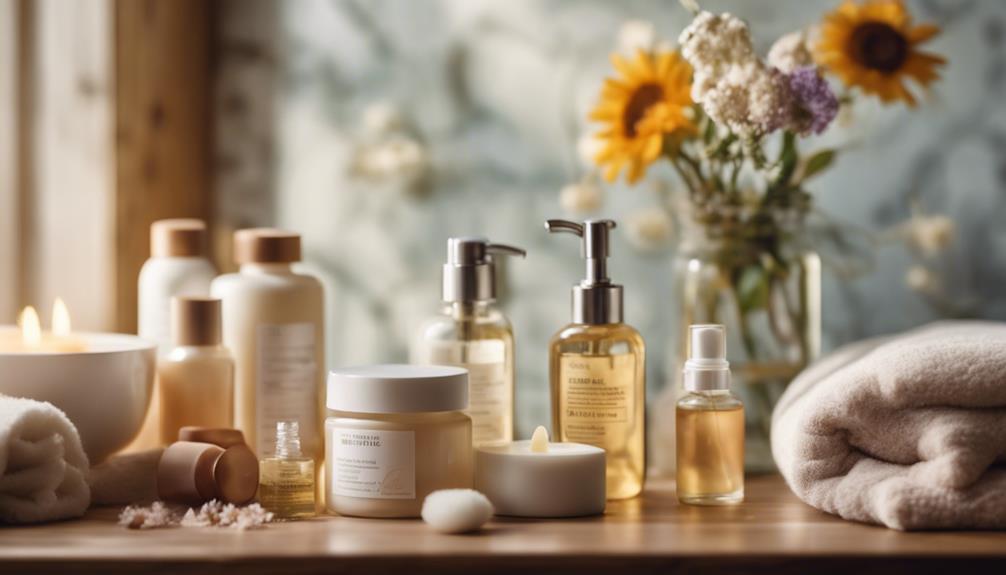
As the seasons change, your skincare routine should evolve to meet your skin's shifting needs and challenges. Different weather conditions can affect your skin type, so it's vital to make seasonal adjustments for ideal skin health.
For instance, winter often brings dryness, making it important to switch to richer moisturizers and hydrating serums. In contrast, summer's humidity may require lighter, oil-free products to prevent breakouts.
Here are some tips for adjusting your routine:
- Winter: Use thicker, cream-based moisturizers to combat dryness.
- Summer: Opt for lightweight, gel-based products to keep your skin feeling fresh.
- Spring: Choose fragrance-free and hypoallergenic products to minimize allergic reactions.
Regularly reassessing your skincare routine every few months will help you address seasonal concerns effectively.
Consulting Skincare Professionals
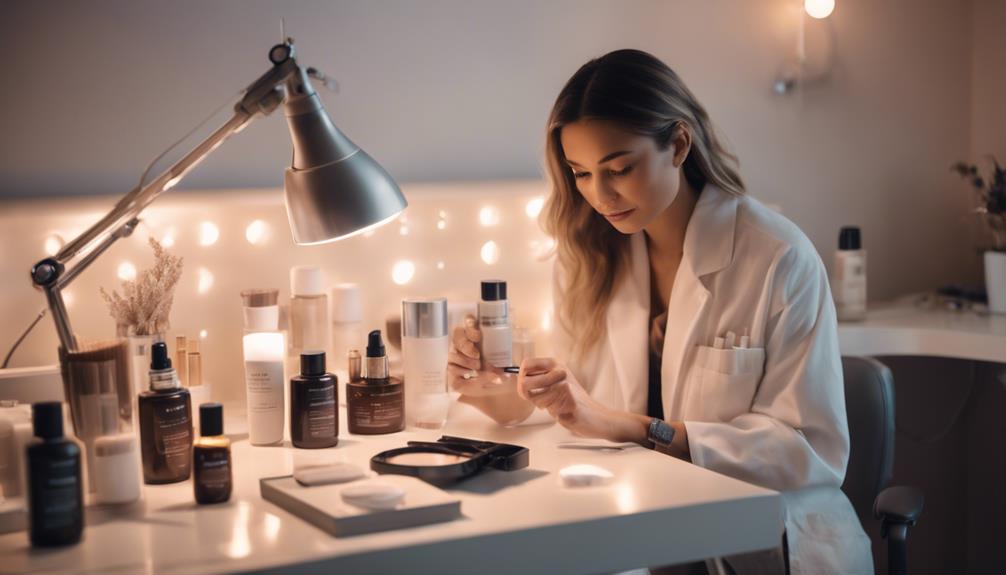
Consulting skincare professionals can transform your skincare routine by providing personalized advice that targets your unique skin concerns.
When you work with a skincare specialist, you benefit from a personalized skincare routine tailored to your individual skin needs. These experts can diagnose complex skin conditions like acne, eczema, and rosacea, offering treatment plans that utilize medical-grade products, which often yield ideal results compared to over-the-counter options.
Staying abreast of the latest trends and research, skincare professionals can recommend products that align with your goals and the evolving nature of your skin. Regular consultations with a skincare expert not only guarantee that your regimen remains effective but also help monitor your skin's health over time. This proactive approach allows for adjustments as your skin condition changes.
Moreover, seeking guidance from a skincare professional can greatly boost your confidence. With tailored treatments and product recommendations, you'll be on the path to achieving clear, glowing skin.
Investing time in consulting a skincare specialist can make a profound difference in your skincare journey, leading to long-lasting improvements and a routine that truly meets your needs.
Can the Personalized Skincare Routine be Tailored for Specific Age Groups, such as the 30s?
When it comes to skincare, a personalized routine tailored for specific age groups is essential. For individuals in their 30s, an ideal skincare routine for 30s would focus on preventing premature aging, addressing any existing fine lines or wrinkles, and promoting overall skin health. It’s important to incorporate products that target specific age-related concerns to achieve optimal results.
Conclusion
You've discovered that a personalized skincare routine can transform your skin, just like finding the perfect outfit for that big event.
By understanding your unique skin type and adjusting your routine with targeted treatments, you're not just caring for your skin; you're boosting your confidence.
So, whether it's summer or winter, remember that your skin deserves the best.
Coincidentally, the more you invest in it, the more radiant you'll feel—inside and out!









